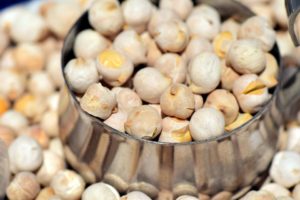Chickpeas is one of the earliest cultivated legumes and 7500-year-old remains have been found in the Middle East.
Contents
Uses
- Chickpea is a key ingredient in hummus, chana masala, and can be ground into flour and made into falafel. It is also used in cold salads and warm soups. The chickpea is important in Indian and Middle Eastern cuisine and in 2016, India produced 64% of the world’s total chickpeas.
Benefits
- Chickpeas are particularly high in fiber. Studies have shown that people with type 1 diabetes who consume high-fiber diets have lower blood glucose levels.
- For people with type 2 diabetes, higher fiber intake may improve blood sugar, lipid, and insulin levels.
- The iron, phosphate, calcium, magnesium, manganese, zinc, and vitamin K in chickpeas all contribute to building and maintaining bone structure and strength.
- Though phosphate and calcium are both important in bone structure, the careful balance of the two minerals is necessary for proper bone mineralization – consumption of too much phosphorus with too little calcium intake can result in bone loss.
- Maintaining a low-sodium (low-salt) intake is essential for maintaining a low blood pressure, however increasing potassium intake may be just as important because of its vasodilation effects. According to the National Health and Nutrition Examination Survey, fewer than 2 percent of United States adults meet the daily 4,700-milligram recommendation.
- The high fiber, potassium, vitamin C, and vitamin B-6 content all support heart health. Chickpeas contain significant amounts of fiber, which helps lower the total amount of cholesterol in the blood, thereby decreasing the risk of heart disease.
- Although the mineral selenium is not present in most fruits and vegetables, it can be found in chickpeas. It helps the enzymes of the liver to function properly and detoxify some cancer-causing compounds in the body. Additionally, selenium prevents inflammation and decreases tumor growth rates.
- Research shows that including chickpeas in the diet lowers the amount of low-density lipoprotein, or bad cholesterol, in the blood.
Cautions
- No side effects are known. Please consult your nutritionist, should any doubt arise.
Interactions
- n/a
Other names
- gram or Bengal gram, garbanzo or garbanzo bean, and Egyptian pea
References
Source: Medicalnewstoday, https://www.medicalnewstoday.com/articles/280244.php
Wikipedia, https://en.wikipedia.org/wiki/Chickpea

